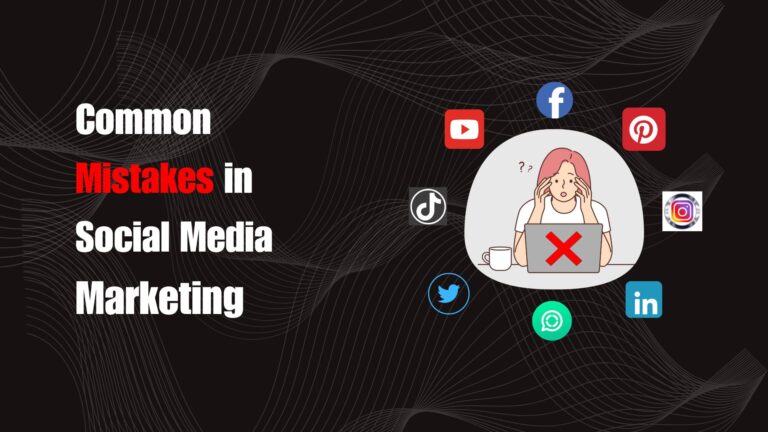Are you looking to boost your affiliate marketing success on social media? Have you ever wondered why some marketers make significant earnings while others struggle to see results? Social media platforms like Instagram, Facebook, Pinterest, and YouTube offer vast potential to connect with an engaged audience, but many affiliate marketers make simple mistakes that can cost them time, money, and trust. In this article, we’ll explore 10 common mistakes in social media affiliate marketing and how to avoid them, so you can start maximizing your earnings and building a more loyal following. Ready to learn from the pros? Let’s get started!
How Social Media is Changing Affiliate Marketing
To understand how social media impacts affiliate marketing, it’s essential to recognize its ability to connect marketers directly with audiences. Platforms like Instagram, Pinterest, and YouTube offer significant sales potential. These tools are effective when marketers follow the proper strategies and avoid common mistakes. Affiliate marketing has evolved with these platforms, making it necessary to stay updated on best practices and identify pitfalls to maximize success. Social media allows for real-time engagement, creating personalized experiences that drive conversions. By leveraging these platforms effectively, marketers can build long-term trust with their audience.
10 Key Mistakes in Social Media Affiliate Marketing
Affiliate marketing on social media is lucrative, but many marketers still fall into common traps. Let’s look at 10 mistakes you should avoid:
1. Not Disclosing Affiliate Links
Transparency builds trust with your audience. Failing to disclose affiliate links can lead to credibility loss, mistrust, or even platform bans. Use clear disclosure like #ad or #affiliate to avoid legal risks. Disclosing affiliate links is not just a legal requirement but also an ethical practice that fosters long-term relationships with your followers.
2. Promoting Irrelevant Products
While high-commission products are tempting, promoting irrelevant items can backfire. This approach can erode trust and decrease engagement. Ensure the products you promote align with your audience’s interests and needs. Promoting irrelevant products could drive potential customers away and make your recommendations seem insincere.
3. Overloading Your Feed with Affiliate Links
Posting too many affiliate links can overwhelm your followers and appear spammy. Instead, mix valuable content with affiliate promotions. Provide useful information, personal stories, and product recommendations. A well-balanced feed will keep your audience engaged without feeling bombarded with ads.
4. Ignoring Analytics and Performance Tracking
Without tracking performance, you can’t improve. Rely on platform analytics and third-party tools to track your affiliate success. This will allow you to make data-driven adjustments and enhance your strategy. Regularly reviewing your performance metrics will help you refine your content and optimize your approach for higher conversions.
5. Not Creating Engaging Content
Content that doesn’t engage won’t drive conversions. Posts that are overly sales-focused or lack creativity may not prompt users to click. Create content that entertains, educates, or resonates with your audience while integrating affiliate offers seamlessly. Engaging content fosters a deeper connection with your followers, encouraging them to trust your recommendations.
6. Failing to Build Trust with Your Audience
Trust is crucial for affiliate success. If followers don’t trust your recommendations, they won’t click on your affiliate links. Build relationships by being authentic, sharing personal experiences, and offering helpful content. The more genuine and transparent you are, the more likely your audience will act on your affiliate suggestions.
7. Choosing the Wrong Affiliate Networks or Programs
Some affiliate programs have low payouts or offer products that don’t suit your audience. Research and choose networks that offer quality products and high commissions. Aligning with reliable networks ensures better results. Opting for trusted programs with great customer service also enhances the overall experience for your followers.
8. Relying Only on One Social Media Platform
Focusing on just one platform limits your reach. Diversify your presence across multiple channels. Facebook, YouTube, and Instagram can all be effective for affiliate marketing when used strategically. A diverse approach allows you to tap into different audience segments, expanding your influence and increasing potential sales.
9. Not Engaging with Your Audience
Ignoring your followers’ comments and messages can damage your credibility. Engaging with your audience by replying to comments and providing feedback helps build loyalty and increases conversion potential. By showing that you care about your followers’ opinions, you foster trust and a sense of community.
10. Overlooking Mobile Optimization
Many users access social media through mobile devices. If your content isn’t mobile-friendly, you risk losing potential customers. Ensure your posts and affiliate links are optimized for mobile viewing to reach a wider audience. Mobile optimization is essential, as more users shop directly from their mobile devices.
Tips for Effective Affiliate Marketing on Social Media
Here are some actionable tips for running a successful affiliate marketing campaign on social media:
-
Post Regularly and Consistently: Maintain a regular posting schedule to keep your audience engaged. Consistency helps in building recognition and trust over time.
-
Create Engaging Content: Craft content that educates, entertains, or adds value. Whether it’s through tutorials, reviews, or personal experiences, engaging content encourages users to interact with your posts and ultimately click on your affiliate links.
-
Leverage Platform-Specific Features: Use stories, live videos, and reels on Instagram, or boards and pins on Pinterest, to engage different segments of your audience. These features provide more opportunities for visibility and interaction.
-
Know Your Audience: Analyze your audience’s behavior and preferences. Tailor your affiliate marketing approach based on their interests, challenges, and preferences for more personalized and effective promotions.
-
Disclose Affiliate Links Transparently: Build trust by being transparent about affiliate relationships. Always include disclaimers like #ad or #affiliate in your posts, which also complies with platform policies.
-
Offer Real Value: Instead of hard-selling products, focus on how the affiliate product benefits your followers. Whether it’s solving a problem or enhancing their lifestyle, the focus should be on adding value rather than pushing sales.
-
Experiment with Different Types of Content: Test various types of content like video tutorials, product demos, and user-generated content to see what resonates most with your followers. Continuous experimentation can lead to better engagement and conversions.
By incorporating these tips into your strategy, you can optimize your affiliate marketing campaigns on social media and build a more loyal, engaged audience.
Final Thoughts
Affiliate marketing on social media offers immense potential for those who approach it with the right strategy. Avoiding common mistakes like irrelevant promotions or lack of transparency will help build stronger connections with your audience and increase conversions. By refining your tactics and staying consistent, you can turn your social media presence into a profitable affiliate marketing channel. With patience and persistence, the rewards of affiliate marketing can be significant, transforming your passion into a reliable income source.
Frequently Asked Questions (FAQs)
What is the best platform for affiliate marketing?
The best platform depends on your niche. Instagram, YouTube, and Pinterest are excellent for affiliate marketers due to their visual nature and large audiences.
Can I post affiliate links on any social media?
Yes, you can post affiliate links on platforms like Instagram, Pinterest, Facebook, and YouTube, but ensure compliance with each platform’s guidelines and disclose affiliate relationships.
How often should I post affiliate content?
Consistency is key. Aim to post a mix of valuable content and affiliate promotions several times per week without overwhelming your audience.
Should I work with multiple affiliate programs?
Yes, working with multiple programs can diversify your income streams. Ensure the programs you choose align with your audience’s interests for better engagement.
Do I need a website for affiliate marketing on social media?
A website isn’t necessary, but it can help build credibility. Having a blog or landing page provides more space to promote affiliate products and boost conversions.


